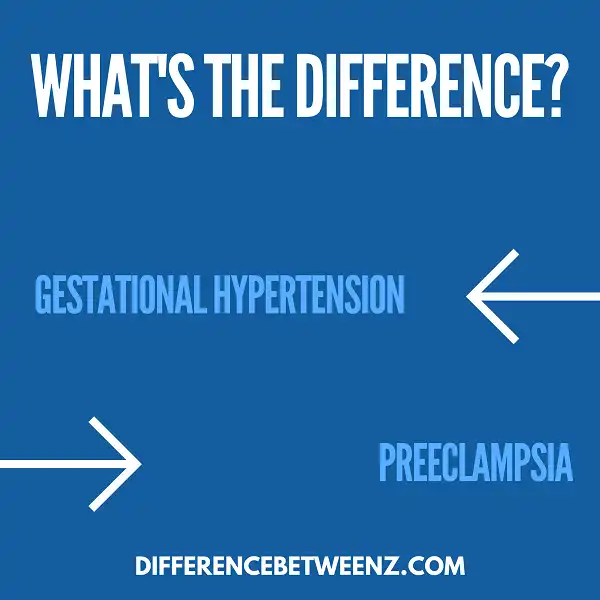Gestational hypertension and preeclampsia are two very different conditions that can occur during pregnancy. Gestational hypertension is a high blood pressure that develops during pregnancy, while preeclampsia is a more serious condition characterized by high blood pressure and the presence of protein in the urine. Despite their differences, both conditions can pose serious risks to both the mother and baby. It is important for pregnant women to be aware of the symptoms of each condition and to seek medical care if they suspect they may have either one.
What is Gestational Hypertension?
Gestational hypertension, also known as pregnancy-induced hypertension (PIH), is a form of high blood pressure that occurs during pregnancy. Gestational hypertension can develop in the second half of pregnancy and typically goes away after delivery.
- In some cases, however, it can lead to preeclampsia, a serious condition that can be dangerous for both mother and baby. Gestational hypertension is often caused by a change in the levels of hormones during pregnancy.
- It can also be caused by an underlying medical condition such as diabetes or kidney disease. If you have gestational hypertension, your healthcare provider will closely monitor your blood pressure and may prescribe medication to keep it under control.
- Gestational hypertension usually doesn’t have any symptoms, but if you experience severe headaches, blurred vision, or abdominal pain, call your healthcare provider right away.
What is Preeclampsia?
Preeclampsia is a condition that can occur during pregnancy or soon after the baby is born. It is characterized by high blood pressure and protein in the urine. Preeclampsia usually develops after the 20th week of pregnancy, but it can occur earlier. Preeclampsia can lead to serious complications for both the mother and the baby. If it is not treated, preeclampsia can progress to eclampsia, a condition that can cause seizures, coma, and even death. Preeclampsia can be treated with medication and close monitoring of blood pressure. In severe cases, delivery of the baby may be necessary. Preeclampsia is a serious condition, but if it is detected early and treated properly, most women and babies recover without any complications.
Difference between Gestational Hypertension and Preeclampsia
Gestational hypertension is when a woman has high blood pressure during pregnancy. It usually happens after 20 weeks of pregnancy. Preeclampsia is when a woman has high blood pressure and other signs of organ damage, like protein in her urine or liver problems. If you have gestational hypertension, it doesn’t usually cause harm to you or your baby. But it can lead to preeclampsia, which can be dangerous. If you have preeclampsia, you will need to be monitored closely and may need to be induced early or have a C-section.
Conclusion
Gestational hypertension is a condition that can develop during pregnancy. Some of the symptoms include high blood pressure, swelling, and protein in the urine. If left untreated, gestational hypertension can lead to preeclampsia. Preeclampsia is a serious condition that can occur during pregnancy or postpartum. Symptoms include high blood pressure, swelling, and protein in the urine. Preeclampsia can cause health problems for both the mother and baby if not treated. Treatment for preeclampsia may include bed rest, medications, and delivery of the baby.


